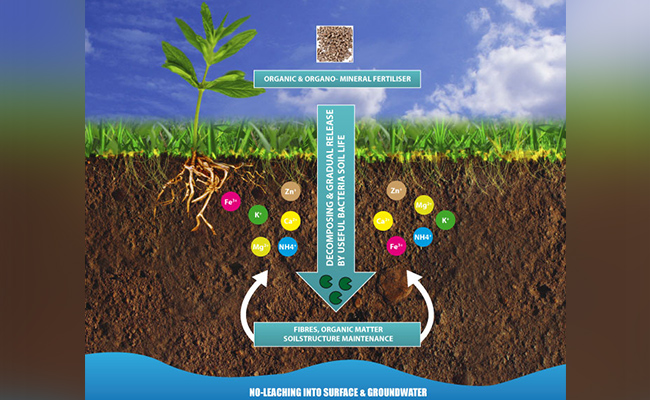Know Different Types of Plant Manures
“Fertilizer does no good in a heap, but a little spread around works miracles all over.”- Richard Brinsley Sheridan
To keep any plant healthy and growing for a long period of time, we need to fertilise them. Fertiliser or plant manures could be any artificial or organic produce which is applied to the planted soil to supply the plant with an ample number of nutrients essential for the plant’s growth. It tends to increase the productivity of plants when applied. Also, increases fertility and improves some medicinal plants, houseplants or any other kind of plant’s water retention capability. To speak of, there are different types of plant manures that are needed by different types of plants. Broadly, there are two classifications done for all the fertilisers, that are, mineral and organic. These two sections of fertilisers are further classified; we shall discuss the same over this blog.

1. Mineral Fertilisers
These fertilisers are made of natural products like air, natural gas and mined ores which are turned into high-quality plant nutrition products as fertilisers. These are further divided into the following kinds of fertilisers:
● Nitrogen Fertiliser - Mostly used in Europe, nitrate-based fertilizers are made of ammonium nitrate (AN) and calcium ammonium nitrate (CAN). Both of these elements are suitable for European soils and climatic conditions. Other than these primary ingredients, such fertilisers are also made of urea and urea ammonium nitrate (UAN) aqueous solution. There are other straight fertilisers such as ammonium sulphate and ammonium sulphate nitrate, calcium nitrate, sodium nitrate, Chilean nitrate and anhydrous ammonia - all of which are even widely used all over the world.
● Nitrogen Fertilizer with Inhibitors - Using straight nitrogen based fertilisers can cause nitrogen immobilisation, denitrification, volatilization or leaching which eventually tends to reduce the efficiency of a nitrogen-based fertiliser. Which is why, the industry came up with something like nitrogen fertilizer with inhibitors which includes foliar, slow and controlled release fertilizers, alongwith urease and nitrification inhibitors to increase the efficiency, all over again.
● Phosphorus Fertilizer - The most popular kind of fertilisers are the ones with single superphosphate (SSP), triple superphosphate (TSP), monoammonium phosphate (MAP), di-ammonium phosphate (DSP) and ammonium polyphosphate liquid in them.
● Potassium Fertilizer - Sometimes when plants lack potassium as their nutrient, farmers can make use of potassium based fertilisers combining two or more nutrients like Potassium chloride (KCl), Potassium sulphate (K2SO4) or sulphate of potash (SOP), Potassium nitrate (KNO3), known as KN.
● Calcium, Magnesium and Sulphur Fertilizers - There’s no denying about the fact that each of the following nutrients - calcium, magnesium and sulphur are much needed by any plant. So, one can use straight fertilisers of these nutrients or can use their various effective sources.
● Micronutrient Fertilizers - Markets are full with micronutrient rich fertilisers such as iron, manganese, boron, zinc and copper. They can be soluble in water or insoluble. They can be either made of organic or inorganic compounds.
● Inhibitors - To delay the nitrification of ammonium by suppressing the activity of nitrosomonas bacteria in the soil, such chemical compounds are used.One other kind of inhibitor would be urease inhibitors that delay the degradation of urea in the soil.

2. Organic Fertilizers
The principal source of organic fertilizers are crop residues, animal manures and slurries. Mostly, farmers are seen to be using organic fertilizers. The nutrients and organic carbon they contain are recycled. The nutrient sources and the physical properties of animal manures and slurries in these fertilisers differ from each other. Also, not all regions will have these elements. The availability and the quality will be varying on the livestock and farm management system across various regions.

3. Other Kinds Of Fertilisers
To offer just the best to farmers, the fertiliser industry has even come up with some new hybrid fertilisers like organo-mineral fertilizer, mineral fertilizer incl. inhibitors, liming material, growing media, plant biostimulants etc. - all of which pertain to a different farm and environmental conditions.

Pros Of Using Fertilisers
● Easy to transport, apply and store.
● Cater to specific nutrient needs of the plants.
● Are water soluble, hence dissolves well in soil.
● Results are seen rapidly
● Increases the yield of crops and is enough to feed a huge population of people.
● Immensely predictable and reliable.
Cons Of using Fertilisers
● Mostly Expensive
● Are toxic for farmers who comes in contact with these fertilisers
● Excess usage of these can damage the plant fully
● Causes eutrophication in river
● Long Term usage of these fertilizers can disturb the ph level of the soil.















